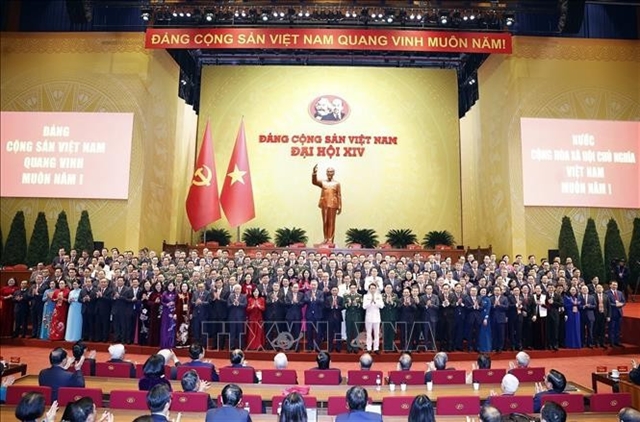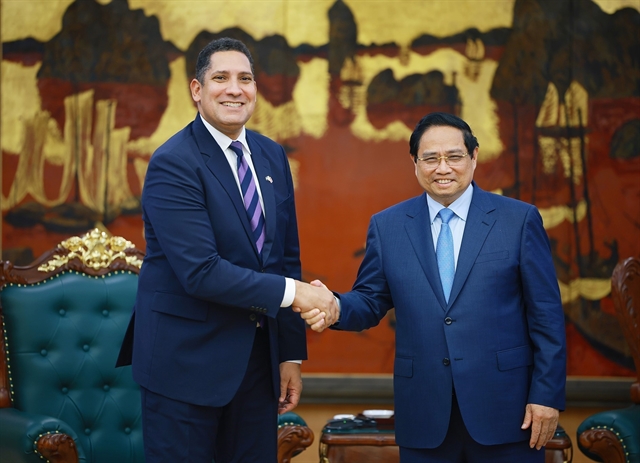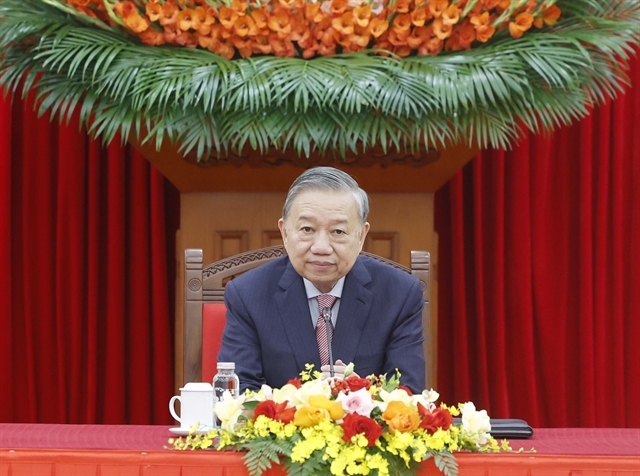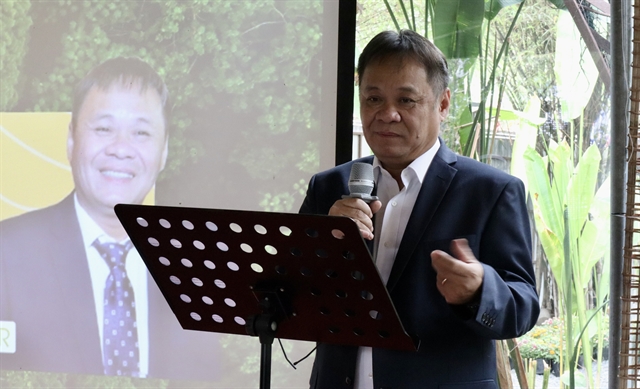 Economy
Economy

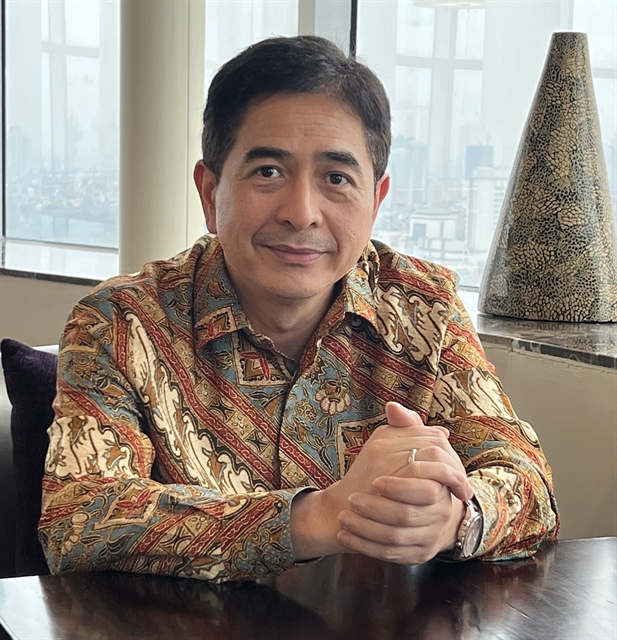 |
| Arsjad Rasjid, Chairman of the Indonesian Chamber of Commerce and Industry (KADIN) and Chairman of the ASEAN-BAC 2023. |
During his two-day visit to Việt Nam on March 13 and 14, Arsjad Rasjid, who serves as both Chairman of the Indonesian Chamber of Commerce and Industry (KADIN) and Chairman of the ASEAN Business Advisory Council 2023 (ASEAN-BAC 2023), discussed policy priorities aimed at enhancing economic and trade cooperation among the ASEAN member countries with Vietnam News Agency. As Indonesia holds the ASEAN Chair this year, the focus is on promoting trade and investment opportunities between Việt Nam and Indonesia.
Could you please clarify the aim and importance of your trip to Việt Nam as the Chairman of the ASEAN-BAC 2023?
We are currently on a roadshow, visiting each country in ASEAN one by one. So far, we have visited Singapore, the Philippines, and Malaysia, and we are now in Việt Nam with the same objective. We want to hear from Vietnamese businesses about what they think about ASEAN and what position ASEAN should play in the world.
As FDI is spread all over the world, it is crucial for us to work together as ASEAN countries. We share a similar culture and demography, with small and medium enterprises forming the foundation of our economy. ASEAN can become an alternative to China for supply chains, so we must work together. Traditionally, we have always worked together in trade and investment, but we must now think ahead.
During Indonesia’s chairmanship, we have introduced five priorities: digital transformation, health resilience, sustainable development, food security, and trade and investment facilitation. We aim to turn these priorities into legacies and even projects.
Regarding digital transformation, we have three legacies. The first is called ASEAN QR code, which is also a symbol of our centrality and is essential for micro, small, and medium enterprises (MSMEs). The QR code will reduce costs, and we will use local currency for settlement. We have discussed sharing the QR code with the Vietnamese central bank, and we plan to sign an MoU with the Philippines as well. Our goal is to inter-connect and we can do it in the ASEAN at the ASEAN Business and Investment Summit in September, which will include ASEAN leaders and dialogue partners such as the United States, the EU, China, and Japan.
The second digital transformation is peer-to-peer digital lending, which will give small enterprises access to funding. Vietnamese businesses or individuals can participate and become lenders to the platform in Indonesia or any other Asian country.
The third legacy is WIKI entrepreneurship, which will connect SMEs in ASEAN. In the past, we have always worked on a government-to-government basis, but it is important to involve people-to-people and business-to-business connections. This will create a symbol of connectivity, networking, and learning from each other. We also want to involve big and medium companies to create demand for small companies in ASEAN. We did a pilot project between Indonesia and Japan and plan to extend this conversation throughout ASEAN.
For sustainable development, we have two legacies: Net Zero Hub and ASEAN Carbon Centre of Excellence. We need to create a roadmap for the net zero journey, as every sector will face different challenges. We want to bring in technology providers from Việt Nam, Indonesia, Singapore, and overseas to work towards this journey. We must not leave any small company behind and work together towards this goal.
The One-Shot campaign is our contribution to health resilience. As we have just passed the pandemic and none of us produce vaccines, we must try to produce vaccines ourselves.
In terms of trade and investment, this is the time for us to focus on the spatial aspect of ASEAN. We should invest more in Asia and increase trade between countries to create complementarity or synergy. Connectivity is key to investment, so we must build the business ecosystem together. For example, Việt Nam and Indonesia are producing electric vehicles. Việt Nam, Indonesia and and the Philippines all have nickel and by combining our resources, we can produce 60 to 70 per cent of the world's nickel, which is essential for us.
How effective has the ASEAN-BAC, serving as the official bridge for the ASEAN business bloc, been in providing support to the business community, including that of Việt Nam?
It is crucial to establish a partnership between the government and the private sector, as we did in Indonesia with Indonesia Incorporated. In the ASEAN level, you should have an ASEAN Incorporated, where the government and the businesses work together, considering a lot of the challenges we face. Despite the pandemic, we achieved economic growth in Indonesia. However, vaccinating 280 million people would have been impossible without cooperation between the public and private sectors. Therefore, working together is essential for us to move forward.
The global economy presents us with several challenges such as high food costs, food scarcity, high inflation rates and energy costs, along with the ongoing China-US trade war and Ukraine-Russia war. In comparison, ASEAN stands out as a peaceful region with stable economic growth, contained inflation, and the potential to create a big market with 700 million people, abundant resources and minerals. We contribute more to the world's economy than the EU or the US itself, with a US$5 trillion economy. To continue this growth, we must co-invest and co-trade within ASEAN while maintaining centrality.
Let's shift our focus to a more specific partnership. What are your thoughts on the current cooperation between Vietnamese and Indonesian businesses?
Firstly, Indonesia and Việt Nam share a strong bond that dates back to the days of Presidents Sukarno and Hồ Chí Minh. Both countries believe in non-alliance and respect each other's sovereignty. Today, we continue to foster this close relationship and work together towards common goals.
Việt Nam and Indonesia are vital players in ASEAN. Investors that I've met have expressed a keen interest in investing in both countries due to their political stability, security, and impressive economic numbers.
The bilateral relationship between Indonesia and Việt Nam is important as we can collaborate and create synergies. For instance, Việt Nam has a robust food processing industry for exports, while Indonesia possesses abundant fishery resources. Therefore, we can leverage our strengths to create synergies between the two countries and across ASEAN. We have even agreed on a sea agreement, which further solidifies our partnership. It is crucial to build on the trust that already exists and work towards more investment opportunities between Việt Nam and Indonesia.
The bilateral trade revenue already hit $13 billion by the end of 2022, and our leaders have set an ambitious target of increasing it to $15 billion by 2028. What recommendations do you have to achieve this goal?
The majority of the trade between Việt Nam and Indonesia currently revolves around traditional commodities such as coal, palm oil, automotive products. However, we have to move beyond that. That's why we're focusing on digital transformation and striving for balance.
We also need to explore other lucrative sectors, such as seafood and sustainable development, including renewable energy. Our aim is to foster complementary business relationships, rather than just relying on traditional trades. We firmly believe that our two-way trade revenue has the potential to not only reach $18 billion but even double. To achieve this, we need to focus not only on trade but also on investment opportunities.
Therefore, we are inviting companies to participate in the ASEAN Business and Investment Summit and the ASEAN Business Awards, to be held in Indonesia in the first week of September. We are also inviting the Prime Minister of Việt Nam to join us in this discussion to further promote business relations between Việt Nam and Indonesia. — VNS

